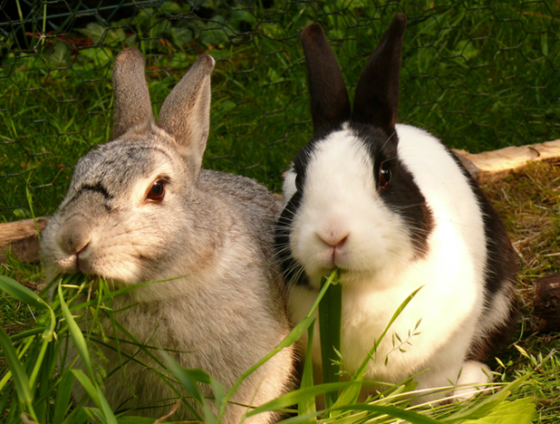Rabbits are semi-sedentary small rodent animals that have been domesticated over time in many countries, serving as food and pets. In Ghana, records of mass rabbit production date back to 1972 as part of the National Redemption Council’s government “Operation Feed Yourself” which sought to mitigate food shortages through self-reliance.
With heavy advertisements and training on rabbit rearing, the industry saw a boost in animal production fulfilling the government’s goal of having a sustainable source of animal protein, all year round. This was until the fall of the NRC government, where everything dwindled significantly.
Rabbit production has a higher advantage compared to other animal productions, due to its low investment and quick financial returns, healthy source of animal protein, high fertility rate, prolificacy and ability to produce all year round. This should be a sure reason why the industry needs attention to thrive. All necessary advice and equipment are right on our doorstep.
Several breeds are available for production, among which involve the California and New Zealand White breeds. Due to their high litter size, quick growth rate and early maturity, these have become the preferred choices for many breeders. Notwithstanding, there are over 50 different rabbit breeds currently exploited in the world.
PRODUCTION
The source of breeding stock is an important step that can define the future of your rabbit business. Ideally, it is recommended to start small with one buck and two does. In Ghana, the average cost for the breeding stock ranges from ¢30 - ¢60. A four-room cage or hutch measuring two feet in height and length, made of wood and metals can cost ¢400.
As monogastric (non-ruminant herbivores), rabbits feed well on wheat and rice bran, maize, carrots, hay, legumes, kitchen leftovers, cocoyam and cassava peels among others. It is advisable to use formulated feed to ensure the best production results. The Animal Production Directorate of the Ministry of Food and Agriculture and the CSIR-Animal Research Institute could be contacted on the appropriate formulations.
Under good management practices, rabbits attain sexual maturity at five months but preferably it is recommended to mate them at 8-10 months. The Male to female ratio for mating is 1:7- 10 does. Does litter four to five times in a year with a gestation period of 30-33 days. Depending on the breed, litter size ranges from three to eight bunnies (baby rabbits). Weaning of bunnies is approximately 40 days and at five months, with an average weight of 2kg, rabbits can be table ready.
BENEFITS
Rabbit meat (coney) is one of the best for human consumption due to its low cholesterol levels and high profile of essential amino acids and fatty acids, vitamins, minerals and antioxidants.
Aside from the nutritional benefits derived from rabbit production, it is an easy way to make quick returns. Starting with 5 bucks and 35 does, an individual can raise 875 rabbits at 5 litter size/ 5 litters/ year and consequently make a gross income of about GHc43, 750.00 per annum.
How? Starting a rabbit farm with 5 bucks and 35 does require an initial investment of about ¢16425. This investment goes into obtaining the breeding stocks (¢2000.00 for 40 breeders), housing (¢7500 for 40 breeders and 35 kits), drinkers, feeders, kindling boxes, water tanks and other equipment that may be needed in the production.
After the business is fully set-up, the annual production cost is about ¢17710.00 with the bulk (70-80%) going into feeding and the remaining cost-covering for health, supplies and administration. Considering the average selling price of a broiler rabbit at 2kg weight of ¢50, selling off ¢1750 offspring from your breeders will give a gross income of ¢43750.
At the end of the year, a new businessman can make a net profit of ¢9615 all things being equal. In subsequent years, the farmer makes a higher profit of ¢26040.00 per annum, all things being equal because the farm would have been fully functional.
CONCLUSION
The rabbit industry represents a cheaper way of making extra income with a bright future. Many people are into this industry and making it big and it is highly recommended that individuals start seeking advice on setting up rabbit farms as an alternative source of income.
****
Authors: Drs. William Tasiame, Yesutor Soku, Ekua Esuon Thompson, Victor Frimpong and Benjamin Kissi Sasu
Latest Stories
-
Afenyo-Markin under fire for ‘strange elevation’ comment to Essikado MP ‘over’ Zanetor
21 minutes -
Abanga Yakubu refutes allegations of leading unauthorised anti-galamsey operations
38 minutes -
Minority, Majority MPs clash over credit for Ghana’s economic gains
1 hour -
2025 NPP Congress: Kufuor, Akufo-Addo to deliver virtual address to delegates
1 hour -
UG lifts ban on social gatherings amid improved COVID-19 situation
2 hours -
Cataract, glaucoma, and pterygium predominant in Ketu North Municipality
2 hours -
I’m not afraid of anyone in the NPP – Mustapha Gbande
2 hours -
Okada rider dies after alleged assault by galamsey taskforce at Amenam
2 hours -
Nkulenu Industries Ltd sign up for JoySports Invitational Tournament 2025
2 hours -
Andrew Adote deserves grand celebration – George Quaye
3 hours -
Ticks are taking over city parks – here’s how to avoid them
3 hours -
ECOWAS mourns Buhari, hails his contribution to democracy and integration
3 hours -
Akua Afriyie defied NPP orders; now she apologises over Ablekuma North re-run
3 hours -
Hitz FM rolls out new weekend line-up with youth-focused programming
3 hours -
GES urges students to report weapons in schools
4 hours

